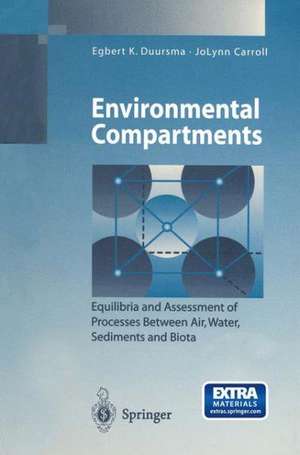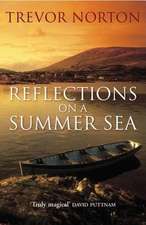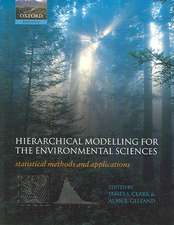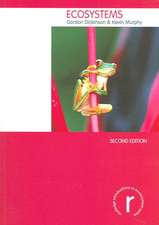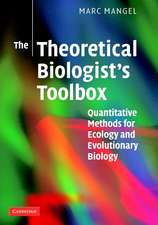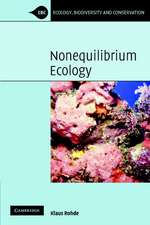Environmental Compartments: Equilibria and Assessment of Processes Between Air, Water, Sediments and Biota: Environmental Science and Engineering
Autor Egbert K. Duursma, JoLynn Carrollen Limba Engleză Paperback – 13 noi 2013
Din seria Environmental Science and Engineering
- 18%
 Preț: 1238.42 lei
Preț: 1238.42 lei - 18%
 Preț: 2166.68 lei
Preț: 2166.68 lei - 18%
 Preț: 1420.88 lei
Preț: 1420.88 lei - 18%
 Preț: 914.20 lei
Preț: 914.20 lei - 18%
 Preț: 1225.94 lei
Preț: 1225.94 lei - 18%
 Preț: 1118.13 lei
Preț: 1118.13 lei - 18%
 Preț: 1402.74 lei
Preț: 1402.74 lei - 18%
 Preț: 3419.93 lei
Preț: 3419.93 lei - 18%
 Preț: 1223.55 lei
Preț: 1223.55 lei - 18%
 Preț: 1008.91 lei
Preț: 1008.91 lei - 18%
 Preț: 1234.46 lei
Preț: 1234.46 lei - 18%
 Preț: 1409.82 lei
Preț: 1409.82 lei - 18%
 Preț: 736.64 lei
Preț: 736.64 lei - 18%
 Preț: 949.73 lei
Preț: 949.73 lei - 18%
 Preț: 1287.47 lei
Preț: 1287.47 lei - 18%
 Preț: 2116.64 lei
Preț: 2116.64 lei - 18%
 Preț: 1231.95 lei
Preț: 1231.95 lei - 15%
 Preț: 641.71 lei
Preț: 641.71 lei - 23%
 Preț: 1129.31 lei
Preț: 1129.31 lei - 18%
 Preț: 1237.93 lei
Preț: 1237.93 lei - 18%
 Preț: 956.18 lei
Preț: 956.18 lei - 24%
 Preț: 1057.93 lei
Preț: 1057.93 lei - 24%
 Preț: 1079.06 lei
Preț: 1079.06 lei - 18%
 Preț: 953.03 lei
Preț: 953.03 lei - 18%
 Preț: 1233.06 lei
Preț: 1233.06 lei - 15%
 Preț: 666.73 lei
Preț: 666.73 lei - 18%
 Preț: 1222.31 lei
Preț: 1222.31 lei - 18%
 Preț: 1242.35 lei
Preț: 1242.35 lei - 18%
 Preț: 1232.89 lei
Preț: 1232.89 lei - 18%
 Preț: 1823.56 lei
Preț: 1823.56 lei - 18%
 Preț: 1228.96 lei
Preț: 1228.96 lei - 18%
 Preț: 1221.69 lei
Preț: 1221.69 lei - 18%
 Preț: 945.79 lei
Preț: 945.79 lei - 18%
 Preț: 1008.28 lei
Preț: 1008.28 lei - 24%
 Preț: 795.49 lei
Preț: 795.49 lei - 18%
 Preț: 1246.47 lei
Preț: 1246.47 lei - 18%
 Preț: 1239.85 lei
Preț: 1239.85 lei - 18%
 Preț: 957.62 lei
Preț: 957.62 lei - 18%
 Preț: 1244.89 lei
Preț: 1244.89 lei - 15%
 Preț: 640.55 lei
Preț: 640.55 lei - 18%
 Preț: 950.33 lei
Preț: 950.33 lei - 18%
 Preț: 1824.01 lei
Preț: 1824.01 lei - 15%
 Preț: 639.59 lei
Preț: 639.59 lei - 18%
 Preț: 947.50 lei
Preț: 947.50 lei - 18%
 Preț: 951.29 lei
Preț: 951.29 lei - 18%
 Preț: 1229.73 lei
Preț: 1229.73 lei
Preț: 388.13 lei
Nou
Puncte Express: 582
Preț estimativ în valută:
74.27€ • 76.74$ • 61.78£
74.27€ • 76.74$ • 61.78£
Carte tipărită la comandă
Livrare economică 19 martie-02 aprilie
Preluare comenzi: 021 569.72.76
Specificații
ISBN-13: 9783642801914
ISBN-10: 3642801919
Pagini: 296
Ilustrații: XV, 279 p.
Dimensiuni: 155 x 235 x 16 mm
Greutate: 0.42 kg
Ediția:Softcover reprint of the original 1st ed. 1996
Editura: Springer Berlin, Heidelberg
Colecția Springer
Seriile Environmental Science and Engineering, Environmental Science
Locul publicării:Berlin, Heidelberg, Germany
ISBN-10: 3642801919
Pagini: 296
Ilustrații: XV, 279 p.
Dimensiuni: 155 x 235 x 16 mm
Greutate: 0.42 kg
Ediția:Softcover reprint of the original 1st ed. 1996
Editura: Springer Berlin, Heidelberg
Colecția Springer
Seriile Environmental Science and Engineering, Environmental Science
Locul publicării:Berlin, Heidelberg, Germany
Public țintă
GraduateCuprins
1 Introduction.- 2 Processes and equilibria between compartments.- 2.1 Principles.- 2.2 Phases or compartments.- 2.3 Processes and equilibria.- 3 Complexing metal- and radionuclide-sediment reactions.- 3.1 Complexation of metals by dissolved organic matter.- 3.2 Results on radionuclide sorption by marine sediments.- 4 Diffusion principles.- 4.1 Theories.- 4.2 Simple methods of determining diffusion coefficients.- 4.3 Experiments on hindrance of diffusing ions in sediments.- 4.4. Summary on effects on molecular diffusion in bottom sediments.- 5 Organochlorines.- 5.1 Introduction.- 5.2 PCB and DDT behaviour in water, PM and sediment compartments.- 5.3 The eel case.- 5.4 Pesticide use and contamination with Tambak (Indonesian brackish-water) aquaculture.- 5.5 Possible DDT and PCB partitioning between air and man.- 6 Competitive reactions and effects of conservativity.- 6.1 Introduction.- 6.4 Principles of conservativity.- 6.3 Model study of competitive processes in an estuary containing a turbidity maximum.- 6.4 Residence times of metals in an estuary.- 6.5 Sources and sinks of chemical constituents in estuaries.- 7 Examples of distribution patterns in estuaries and seas.- 7.1 Budget of plutonium and some other nuclides in an estuary.- 7.2 Metals in the Western Mediterranean.- 7.3 PCB budgets.- 7.4 The food chain accumulation paradox.- 8 Nuclear waste in the Kara Sea.- 8.1 Introduction.- 8.2 History of radioactive waste dumping in the Kara Sea.- 8.3 Inventory of dumped objects.- 8.4 Environmental concentrations of radionuclides.- 8.5 Predicting future radionuclide releases.- 8.6 Modelling radionuclide dispersion.- 8.7 Impact assessment.- 9 Globel oceanic and atmospheric stability of oxygen.- 9.1 Oxygen budgets.- 9.2 Relation to CO2 budgets.- 9.3 Time-dependent process.- 9.4 Future limit(s) of ocean pH due to fossil-fuel produced CO2.- 10 Case studies on Environmental Impact Assessment (EIA).- 10.1 Introduction.- 10.2 Techniques.- 10.3 A Delta-case EIA study.- 10.4 Assessment of diffusion of radionuclides from potential HLW disposal.- 10.5 Amoeba assessment.- 10.6 COSMO-BIO assessment.- Appendix I: Answers to a question and exercises.- Appendix II: Kara Sea box model user information.- Appendix Ills COSMO-BIO assessment.- References.
Textul de pe ultima copertă
In order to achieve viable solutions to present-day environmental problems, professionals must understand the spatial and temporal links which exist between the different environmental compartments of biota, air, water, and land and aquatic sediments. This book explains many of the seminal theories used to identify links and predict the movement of natural and anthropogenic chemical compounds among environmental compartments. Theories are presented within the context of laboratory and field examples. Examples are given for many issues of public concern. New insights into theories regarding accumulation of contaminants such as PCBs are presented, challenging the passive acceptance of previously held dogma. The book is primarily for university education, but is also intended as a resource for environmental scientists and policymakers. To encourage self-study a number of exercises are incorporated in the text and two demo models are provided on a diskette, one showing radionuclide transport from dumped nuclear waste in the Kara Sea, the second illustrating the role of biodiversity in coastal zone management.
